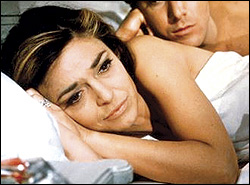Anne Bancroft died last week, and let’s face it, a lot of late has died right along with her.
Though she won an Oscar for her work in The Miracle Worker, she’ll always rightfully be best remembered for her classic portrayal of the contemptuous, conflicted Mrs. Robinson in The Graduate. The movie came out in 1967, the year I was born, and, being as introspective and self-centered as I am, I always look at works of popular culture from that year as harbingers of how things would evolve over my lifetime. I used to think that The Graduate knew, best of all, that my world would be full of a sort of exhilarating yet uncertain freedom, based on the film’s famous last sequence: Dustin Hoffman’s Benjamin Braddock—fiercely, ironically brandishing a large crucifix as a weapon—and Katherine Ross’ Elaine Robinson fleeing Elaine’s wedding to board a bus into an exciting, awkward, nameless future.
Those moments used to fill me with a daunting hope—one should flee the conventions and burdens of the previous generation, sure, but do it to make something more, something bigger, something greater. It’s a terrific denouement, a rare Hollywood refusal to wrap the sometimes intimidating thrill and spontaneity of living into a tidy little ending. It fills you with elation but gives you pause. You watch Benjamin and Elaine run onto that bus and you think, “Go, go, go! Oh . . . ” The sight makes you think, whatever happens, that you don’t want their lives, their country, to end up a place where people stand by swimming pools and give each other empty advice about “plastics.”
And now? Now I fear it’s the furious loneliness of Bancroft’s Mrs. Robinson, a married woman who has all but given up on real feeling because that’s what society expects of her, that may have more accurately prophesied what America would really become. Plastics? Not only did we take that advice, we ran with it, and not onto a bus but onto the airwaves and into the magazines and everywhere else anyone would listen. Plastics? This country is a paean to plastics—soulless, material conformity. People willingly compete on national television to win a job working for a man whose catchphrase is, “You’re fired.” We’re not Benjamin Braddock anymore, if we ever were. We’re shaking hands with the plastics guy and taking his card.
Even The Graduate itself went plastic, naturally. It hit Broadway in a coarse stage version that was a successful corporate attempt to make money off an anticorporate memory, to get cash rolling in by whoring our nostalgia for escape. The stage version treated Mrs. Robinson as a grand sexual joke, and the story as the ultimate slap-and-tickle farce for a Gap generation, who presumably only thinks of the movie as something hip to reference over drinks. By the time the play went on tour, it had picked up ex–Flamingo Road vixen Morgan Fairchild, who was asked to play Mrs. Robinson like a drunken quipster auditioning for a new Cybill Shepherd sitcom. When the production arrived in the Northwest, right above the title on the ticket for the show were the words “Fred Meyer Broadway in Seattle.” Well, indeed.








